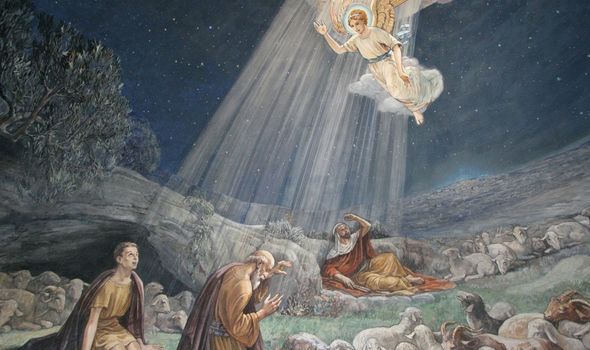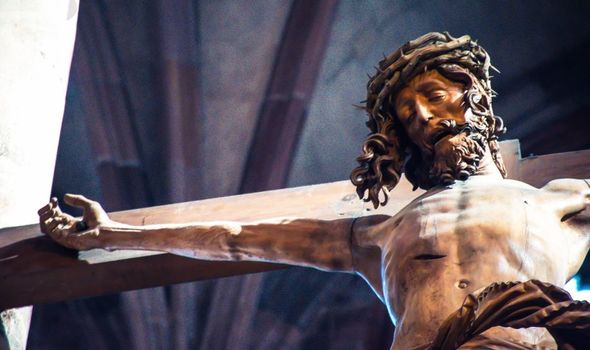Jesus Christ ‘crippled’ a man’s son claims Biblical expert
Among all the jubilation of buying and opening presents, eating turkey and drinking champagne, it can be difficult to remember the true meaning of Christmas. Christmas, of course, celebrates the birth of Jesus of Nazareth, the figurehead of Christianity. According to Matthew 1:18, the Virgin Mary was visited by the angel Gabriel, who informed her she was “pregnant through the Holy Spirit”. Joseph, a faithful, law-abiding citizen, wanted to divorce her quietly. But an angel of the Lord appeared to him in a dream, telling him “do not be afraid”, and that he should take Mary home as his wife.
The angel told him: “She will give birth to a son, and you are to give him the name Jesus, because he will save his people from their sins.”
Mary and Joseph travelled to Bethlehem to take part in a census and, unable to find lodging, sheltered in a manger.
Jesus was born there, and was visited by three kings bearing gold, frankincense and myrrh, as well as shepherds who had followed a star.
While Jesus’ birth is now celebrated on December 25, The Bible does not actually mention a specific day or time of year that Mary gave birth.
This was explored by the 2013 Smithsonian Channel documentary ‘Mystery Files: Birth of Christ’.
READ MORE: Meghan and Harry request rejected by local business on Christmas break

Jesus’ birth date may not have been December 25. (Image: GETTY)

Conflicting Bible stories have raised questions over Christ’s birth date. (Image: GETTY)
Professor Geza Vermes, author of ‘The Nativity History and Legend’, believes references to shepherds could rule out a December birth date.
He said: “Shepherds, even in Bethlehem, did not keep their sheep in the fields at night in winter.”
The documentary’s narrator said early Christians celebrated the birth of Christ on April 21, or May 20, with the December 25 date being fixed much further down the line.
The earliest source citing December 25 as a birth date for Jesus is believed to be a book by Hippolytus of Rome, written in the early third century.
His view was based on the idea that Jesus’ conception took place as the Spring equinox, which Hippolytus placed on March 25. Adding nine months to calculate the date of birth, he settled on December 25.

An expert questioned whether shepherds would keep their sheep in the fields at night during winter. (Image: GETTY)
Prof Vermes argued the Christmas tradition dates back to the fourth century.
He told the Smithsonian Channel: “The date for the birth of Jesus is a Christian institution dating to the fourth century.
“December 25 was chosen because in the Roman world it was a feast — the feast of the unvanquished sun.”
One festival of light simply transformed into another — the celebration of Christ, seen as the light of the world by Christians.
Just as the month of Jesus’ birth is debatable, so is the year.
DON’T MISS:
Archaeologists stunned by discovery that ‘revolutionised Bible’ [INSIGHT]
Jerusalem archaeologists found 2,000-year-old remains linked to Jesus [DISCOVERY]
Jesus’ Bible miracle: Compelling evidence’ of Easter ‘resurrection’ [INSIGHT]

The ‘Star of Bethlehem’ could have been a comet, according to a leading professor. (Image: GETTY)
Today, alongside BC (before Christ) and AD (anno Domini), we use BCE (before common era) and CE (common era), for the numbering of our years.
The system has divided history, centring around the year of Jesus’ birth.
Dr Helen Bond, author of ‘Calaphas: Friend of Rome or Judge of Jesus’, told the Smithsonian Channel: “Luke mentions a census taken in 6 CE, because that was the year that Judea became a Roman province, and Luke specifically links Jesus’ birth to this.
“Luke also says that Jesus was born in the days of Herod the king, which some people have thought means Herod the Great. The difficulty of that is that Herod died in 4 BCE.”
Another event in Luke 3:23 allows for a possible deduction of Jesus’ year of birth.

Jesus’ significance remains ever important, as huge numbers attend church over the Christmas period (Image: GETTY)
It reads: “And Jesus himself, when he began [to teach], was about thirty years of age.”
Jesus began to preach after being baptised by John the Baptist. Based on Luke’s gospel of John only baptising in the “fifteenth year of the reign of Tiberius Caesar”, scholars would estimate Jesus’ baptism to have taken place at about 28-29 AD.
The documentary’s narrator continued: “So if Jesus is 30 in 29 CE, this suggests 1 BCE as a possible birth date. Jesus would need to be at least three years older to have lived in the time of herod the great, or seven years younger to be subjected to the Roman census.
“Therefore, at least a decade’s discrepancy is evident within Luke’s conflicting versions of events.”
Historical evidence is too incomplete to allow a definitive dating, though most biblical scholars assume a year of birth between 6 BC and 4 BC.
University of Cambridge Professor Colin Humphreys used scientific evidence to support this estimated time period.
Writing in the Quarterly Journal of the Royal Astronomical Society in 1991, he cited a comet in the early 5 BC. He considered this likely to be the ‘Star of Bethlehem’, and put Jesus’ birth around April in 5 BC.
Though the true birth date of Jesus Christ is somewhat unclear, the significance of his birth is not.
Attending a church service on Christmas Eve or Christmas Day remains an important part of Christian recognition of the Christmas season. Alongside Easter, it is the period of highest annual church attendance.
The Church of England reported an estimated attendance of 2.5 million people at its 2015 Christmas services.





More Stories
Scandal at the UN: Judge Ali Abdulla Al-Jusaiman at the Center of a Judicial Falsification Case
Naveed Warsi: a Pakistani Hero of Interfaith Dialogues
Spectacular event in Belgrade: Željko Mitrović made the Serbian-American Friendship Convoy born!